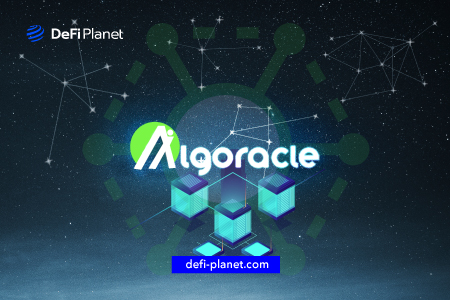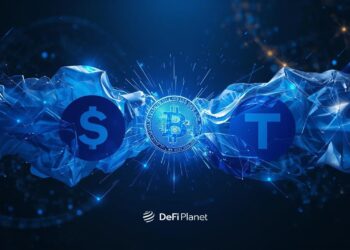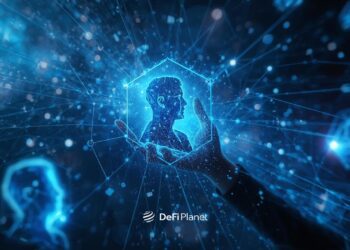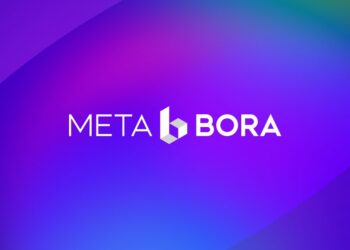Last updated on June 21st, 2022 at 05:30 pm
In a world of constant data breaches and fake news, it’s easy to understand why the importance of a decentralized oracle network cannot be overemphasized. A typical blockchain is designed to be independent of others, having its own architecture, consensus mechanism, and other elements. Projects built on various blockchains require accurate data to operate. Sometimes, the decentralized platform may require data from within its blockchain or from other networks.

Where the information required resides on other networks or in offline sources, the blockchain in question is incomplete and cannot function as usefully as it should. This problem of getting relevant data (one that is reliable and has integrity) onto a blockchain is known as the “last mile problem”.
Smart contracts rely on data to exist and operate efficiently. This need birthed the concept of blockchain oracles. A data oracle brings information to smart contracts from outside sources, and a decentralized oracle is one that’s not controlled by a single entity. Oracles are simply a means of getting real-world data into a blockchain. They can provide anything that a smart contract could use as input:
- The temperature in New York City
- Whether it’s going to rain this afternoon
- The current price of Bitcoin
- A tweet from Elon Musk about AI taking over the world
Algoracle is currently pioneering the development of decentralized oracle networks for Algorand-based projects. This article comprehensively analyzes the Algoracle project and why we believe it will stand the test of time.
What is Algoracle?
Algoracle is reinventing the dynamics of communication and interaction on the Algorand blockchain with its decentralized abstraction layer oracle network. Accurate information is crucial for any platform hosted on a blockchain, especially one governed by smart contracts. Algoracle is building an architecture of decentralized oracles that will provide different smart contracts with access to accurate data. The data feeds provided come from both within and outside the Algorand network.

Decentralized platforms can choose to customize their data feeds to include information on events occurring outside of the blockchain space, such as the weather, and events occurring in real-time in the blockchain space, such as crypto prices.
Why is the Algoracle decentralized oracle system essential?
Smart contracts are essential components of decentralized apps, whether they are decentralized financial protocols or NFT ecosystems. They are efficient because they are automated and cannot be altered once they are embedded in a blockchain, but they do have a significant disadvantage. Accessing the data that smart contracts require to function efficiently is a Herculean task.
In most cases, a smart contract cannot interact with entities outside of its architecture. Their code prevents them from interacting with other smart contracts or even with entities outside of their network. The concept of blockchain oracles was developed to make this possible.
In the case of the Algoracle decentralized oracle system, it addresses the aforementioned design flaw of smart contracts while also providing a haven for them to acquire accurate essential data without the involvement of a centralized entity. In centralized oracles, there is a risk of a single point of failure, as well as the possibility of an attack giving DeFi protocols and NFT platforms access to erroneous data.
Algoracle’s oracle system differs from standard centralized oracles. A centralized oracle relies on a single source, while in contrast, Algoracle’s decentralized design is made up of many smaller pieces that can be verified independently by nodes within the network. This makes it much more difficult for hackers to damage or compromise the system as a whole.
The Algoracle decentralized oracle system eliminates the need for a centralized source of data and serves as the solitary source of truth. In the case of Algoracle, a network of decentralized oracles ensures that only correct data is provided to various projects.
The operation of a smart contract can be hampered by an inaccurate data feed, particularly if there is no efficient system in place to ensure that only the appropriate data is filtered to different users. A carefully programmed smart contract may become corrupted if it is fed the wrong type of data.
Decentralized oracles like Algoracle are more reliable because they are built into the blockchain itself and do not rely on third parties like traditional web APIs that may go down due to maintenance issues or normal internet outages (especially during natural disasters such as hurricanes).
Centralized oracles are similar to enterprise databases, which means that smart contracts that rely on them may lose their intrinsic element of decentralization.
During the conceptualization of its architecture, Algoracle understood that maintaining a centralized oracle system may lead to their introducing middleware into the many platforms that consume their services. Instead, they opted to create a system that collects data from a variety of sources without relying on a centralized authority.
Algoracle: A Brief History
Algoracle was founded by Abdul Osman, a maverick in the blockchain and traditional technology spaces. He was aware of the issues that platforms and smart contracts have to deal with when they rely on centralized oracles, especially with the drawbacks associated with them. There was a need to solve the popular oracle problem that plagued existing solutions.
After a thorough analysis of the situation, he conceptualized Algoracle, while working with a dedicated team of blockchain developers, software developers, and other relevant stakeholders to develop the decentralized oracle system.
Algoracle’s Use Cases
Algoracle is a decentralized oracle network that provides on-chain and off-chain data to clients. Platforms can choose the type of data they want and customize the features to their liking. Developers are also welcome to contact Algoracle to discuss the creation of a cutting-edge oracle system to cater to their specific requirements. The steps below illustrate the Algoracle decentralized oracle system’s operational flow:
- Algoracle features an architecture that monitors the Algorand chain for any platform requests to source both on-chain and off-chain data.
- Once a request is received, the decentralized network searches data from numerous sources, selecting the most accurate results.
- After data search and retrieval, it is organized into an easy-to-understand format for the smart contract to understand.
- The data is verified immediately after formatting.
- The data is then sent to the smart contract or user that requested it.
- The preceding processes are carried out in real-time.
How does Algoracle work?
Algoracle is a decentralized oracle protocol built on the Algorand blockchain, designed to let smart contracts access data from the real world. Decentralized oracles are very similar to APIs: they handle incoming and outgoing requests from users and provide details of how the request should be processed before passing it on to other users.
Smart contracts are automated programs that execute actions when certain conditions occur (kind of like an “if” statement). However, smart contracts can’t do anything that isn’t already programmed into them by their developer—they don’t have any external resources or information at their disposal. This makes them useful for some tasks but not others.
Suppose you wanted to create a program that would automatically make payments in USD each time a person’s heart rate rose above 200 beats per minute—you couldn’t do this using only blockchain-based technologies. Algoracle allows developers to use smart contracts for tasks like this by providing access to external data through APIs.
Who are the key players in Algoracle?
To understand how Algoracle works, we must first identify the major participants.
Algoracle involves three major categories of participants: feed providers, node runners, and bounty hunters.
Feed Providers: These are the individuals or organizations who provide relevant data feeds to Algoracle in exchange for rewards. It’s important to note that feed providers must be independent of all nodes to ensure the integrity of their contributions. They must also have a valid use case for their data sources, as they will be validated by bounty hunters.

Node Runners: Node runners host and run nodes, which are essentially servers with IP addresses, on which Algoracle operates and relays data feeds. The greater the number of nodes, the more trustworthy the network. In reality, this implies that if something goes wrong with one node, such as a power outage or an attack, the others will continue to function normally.

Bounty Hunters: Bounty hunters evaluate feed providers’ data feeds and sources to ensure that the data provided is accurate and legally obtained. Bounty hunters search for malicious activity within the network. They examine every transaction that occurs between participants within the protocol and look for any suspicious activity, such as duplicated transactions or late data submission from feed providers.
Visit Algoracle’s blog for more information on these processes.
What types of platforms can use Algoracle?
Every blockchain-based platform requires the services of a decentralized oracle system.
Some of Algoracle’s various applications are listed below.
- Shipment
Companies that distribute products rely on GPS to navigate, and the technology that powers this feature is centralized. It is vulnerable to a single point of failure, and data can be corrupted.
A decentralized oracle system, such as Algoracle, sources data in real-time from numerous sources, lowering the possibility of being fed corrupted data.
- Yield Farming
Yield farming involves crypto enthusiasts providing liquidity in pools in exchange for rewards. The injected liquidity could be utilized to support decentralized lending or exchange features.
Pools are typically governed by smart contracts, and as indicated above, this type of contract requires real-time access to accurate data.
- Decentralized Exchanges
Decentralized exchanges (DEXs) are cryptocurrency exchanges that are not controlled by a centralized authority. It may come in the form of a peer-to-peer trading platform or a peer-to-contract exchange.
When a trader adds stop-loss functionality, the DEX must be notified when the stop-loss price is reached. With Algoracle’s decentralized oracle architecture, DEXs can seamlessly access accurate pricing information in real-time using Algoracle’s price feed and make appropriate decisions.
- Money Markets
The term “liquidation” is common in money markets. If a crypto enthusiast takes out a crypto loan, they are generally expected to provide collateral that is greater than the loan amount.
The value of the collateral may drop as a result of the volatility of the crypto market. If the value drops below a certain threshold without the user topping up their collateral, it may be liquidated. Smart contracts, on their own, have no idea when a position should be liquidated.
Algoracle’s decentralized oracle system feeds the smart contracts with real-time and accurate data to ensure that liquidation occurs as scheduled.
- NFT Gaming
Algoracle’s use cases are not limited to financial services. Crypto gaming platforms may need to modify the value or appearance of their NFTs to include lands, avatars, weapons, and other items. To execute these modifications, an oracle system is required to feed data to the smart contract.
Suppose an NFT gaming platform wants to modify the value and appearance of an NFT based on changes in the weather or events in the real world. A smart contract can trigger these changes when the events are met, but how does the contract know that the changes have occurred? This is done via an oracle system.

In Conclusion,
- Algoracle is a decentralized abstraction layer oracle network built on the Algorand blockchain.
- It acts as a bridge between smart contracts and sources of information.
- The sourcing, verification, and other processes are done in real-time.
- Algoracle aims to provide its users with the advantages of decentralized oracle systems.
To find out more about Algoracle, visit their website, join their Discord and follow them on Twitter and LinkedIn.
If you would like to read more articles like this, visit DeFi Planet and follow us on Twitter, LinkedIn, Facebook, and Instagram.
“Take control of your crypto portfolio with MARKETS PRO, DeFi Planet’s suite of analytics tools”





















